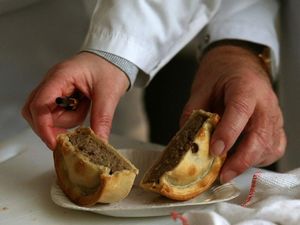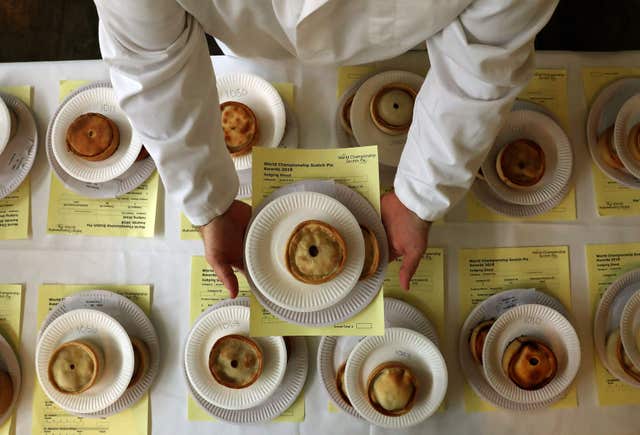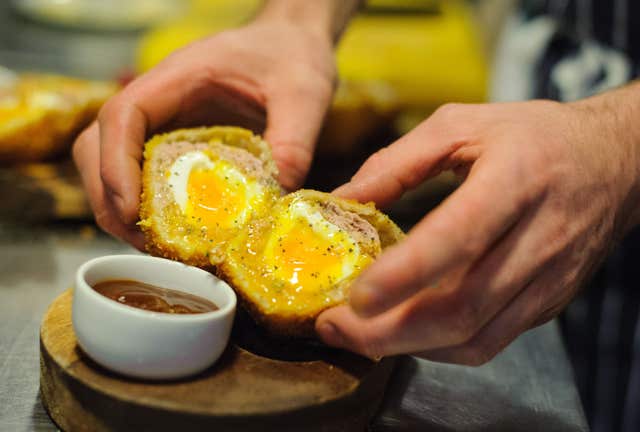6 times it’s OK to use the word ‘Scotch’, and why you don’t want to get it wrong
For the people of Scotland, the term Scots or Scottish must be used.

When judging got under way at the World Scotch Pie Championships, the experts were more concerned about fillings and pie casings than linguistics.
But the word “Scotch” is one that needs to be treated with care lest you risk offending anyone within earshot.
To put it simply, it needs to be reserved for talking about foods and items, and never to mean the people of Scotland.

“Because it’s disliked, the word ‘Scotch’ survives only in fixed expressions – compounds like Scotch pine, Scotch pie, Scotch broth.”
With that lesson in mind, here’s the times when it is OK.
1. Scotch Egg

Its origins are disputed but high-end retailer Fortnum and Mason claims to have made the original Scotched egg in 1738 as a “meal on the move”. It still sells the eggs, explaining: “Often imitated, but ours still sits proudly as the original portable pick-me-up.”
Neil Chambers from the Handmade Scotch Egg Company told the Daily Telegraph in 2011 that the snacks were a Scottish equivalent of the Cornish pasty – a “poor man’s lunch produced from leftovers that was easy to transport” – no involvement of Fortnum and Mason needed.
2. Scotch Broth
Dictionary Merriam-Webster records its first use in 1735.
“The term ‘Scotch’ has fallen in and out of favour over time,” said Jane Solomon, lexicographer from Dictionary.com.
“Starting in the late 1700s, more educated people in Scotland began to view the adjective ‘Scotch’ as vulgar, while ‘Scottish’ remained a more neutral term.
“In the 20th century, educated English people began to adapt to the Scottish preferences and the adjective ‘Scotch’ declined in use at that point.”
3. Scotch Bonnet

Some people said the shape of the pepper looks like a Tam o’Shanter hat, a name which itself comes from a Robert Burns poem. As to whether the pepper looks like a hat is another thing.
The revival of “Scots” and “Scottish” coincided with the revival of Scottish literature, such as that of Burns, said Clifford Sofield of the OED.
“‘Scotch’ is perceived as an English word and people in Scotland really prefer ‘Scots’ and ‘Scottish’ to ‘Scotch’.”
The hottest possible Scotch bonnet is 140 times spicier than a mild jalapeno, Pepperscale.com claims.
“This chili has a slightly sweet taste to it, sort of like a tomato with a slight hint of apples and cherries. It’s very closely related to the habanero… just add in more sweetness.”
4. Scotch Corner

Its name comes from a decision travellers could make at this point in their journey depending on where they are heading in Scotland.
It’s the same now. Motorists can continue along the A1 (M) for Edinburgh and the east of Scotland, or turn on to the A66 for a quicker route to Glasgow and the west of Scotland via Carlisle.
5. Scotch Whisky
Whisky made in Scotland can also be called Scotch. It’s also spelt w-h-i-s-k-y, whereas in Ireland and the US they tend to use the spelling w-h-i-s-k-e-y – with an “e”.
Its earliest appearance was in 1494, explains the Scotch Whisky Association, according to tax records. There was such a large quantity recorded that it’s probable “distilling was already well established”.
Scotch Whisky must be matured in oak casks for a minimum of three years, although it’s the norm for it to mature for much longer before going on sale.
No-one will be offended by someone asking for a Scotch to mean the drink.
6. Scotch Pie

As well as pies, the 50 experts tasted sausage rolls, vegetarian savouries and even apple pies.
We don’t know if George Orwell ever ate a Scotch pie but he was well up on linguistic trends.
Writing in the Daily Herald in 1947 he counselled against getting the wording wrong when it comes to Scots v Scotch.
“If a Scotsman objects to being called a Scotchman… it is only the most ordinary politeness to do what is asked of one.”
Quite.





